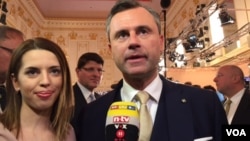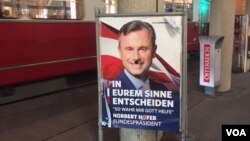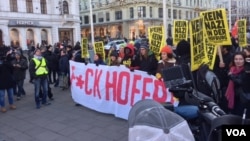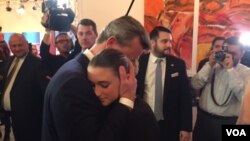Austria’s anti-immigrant candidate, Norbert Hofer, has failed in his bid to become the country’s first far right leader since World War II, in an election seen as a test for the strength of populist movements in Europe.
The former aeronautical engineer, who campaigned on an anti-establishment, anti-immigrant, anti-EU platform, conceded defeat to his environmentalist opponent, Alexander Van Der Bellen, who ran as an independent.
Media projections said Van der Bellen won with 53.3 percent of the vote, compared to Hofer’s 46.7 percent, a victory that Van der Bellen said is a “signal of hope and change” to “all the capitals of the European Union.”
Hofer had been poised to become the EU’s first far-right leader, as unease became evident in the country in the wake of a migrant crisis that has seen tens of thousands of Muslims seek asylum in Austria.
In Vienna on Sunday night, Hofer went before reporters at the city’s Hofburg Palace and pledged to keep up his efforts to ensure that the more than 46 percent of Austrians who voted for him were not ignored. “We are not done,” he said.
Asked by VOA what message these elections had sent to the establishment, Hofer replied, “Look at me. I will fight for the next elections.”
The poll’s outcome was despite a campaign dominated by anger over issues of Muslim immigration, the financial burden of refugees and migrants who are collecting benefits from Austria's welfare system, and Europe's wave of terrorist attacks over the last year, following the start of the migrant crisis.
Some voters on Sunday lamented the bitter divisions that the race exposed.
“This election in general is tragic,” said Eva, a voter who cast her ballot in Vienna’s first district. “It’s very tragic because we were having another person, Hofer, who speaks more for the old way of thinking, of pushing people against each other and is more in a rightist direction, in a fascist direction, like Hitler.”
Sunday's poll was held after the results of an earlier vote on May 22 had Van Der Bellen ahead of Hofer by 31,000 votes. Austria’s constitutional court annulled the results due to vote counting irregularities.
The campaign, one of Austria’s longest, was marked by anger.
A newspaper headline described it as an “Election of Hate,” reflecting pent-up frustrations among Hofer’s rightist supporters, and fear and bitterness among his leftist detractors who have labeled him a Nazi for his anti-immigration stance in the face of Europe’s migrant crisis that saw more than 1 million refugees and migrants enter Europe last year, many of them through Austria.
Analysts say Hofer sought to benefit from the anti-establishment mood sweeping across the U.S. and Europe that has been partly inspired by Britain’s decision to leave the European Union and the victory of Donald Trump in the United States.
The trend perplexed Florian, a voter in central Vienna.
“Even though this is the most peaceful time ever and people have the most money ever, there seems to be an uncertainty and that’s why they are prone to fall for the promises that the rightist movements give,” Florian said after casting his ballot Sunday.
More than 90,000 people applied for asylum in Austria last year, a figure that causes concern in a nation whose population is less than 9 million.
The sentiments also have been spurred on by terror attacks in Belgium and France – all of which have happened since the start of last year’s migrant crisis.
“Even though you’re scared, you cannot look away and say ‘ok, we don’t want to do have anything to do with this.’ We have a history in Austria regarding this and that’s why I think we have the responsibility to stand up together with the rest of the world and if they don’t go along, we have to lead as an example,” Florian, a Van Der Bellen supporter, said.
Hofer’s campaign posters across central Vienna were defaced with swastikas and mustaches that made Hofer resemble Adolf Hitler.
The Nazi connotation was especially sensitive given Austria’s history in the last century. The country was the birthplace of Hitler and was annexed by Nazi Germany in 1938.
Hofer’s younger supporters include members of Austria’s Identitarian movement, a group that opposes multiculturalism. 27-year-old Martin Sellner, a member, said his opposition to Muslim immigration is based on concerns that Muslims eventually may outnumber native Austrians and overwhelm their culture, and not on xenophobia or racism.
Analysts said that while Van der Bellen’s margin of victory appeared to be wide, a strong showing by those who oppose or at least question Austria’s immigration policies cannot be ignored by the new leadership.











